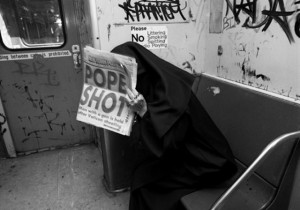Who’s better than Luc Sante? No one, that’s who. The New Yorker editors can blow me off and not interview me when I contact them about jobs–and they do–but the Low Life writer should certainly have a perch at that publication. It’s less the New Yorker for him not being there.
The one time I interviewed Sante years ago, we talked about NYC during the 1970s and early 1980s, when he was making his bones here and was something of a bone-and-rag man, vying for valuables in the struggling city’s castoffs, each corner of Manhattan seeming to contain raw materials for the sharp-eyed alchemist: discarded LPs, dusty books, yellowed pamphlets from the distant past. Sante said to me, ruefully, of that time: “I thought it was prelude.” But the magic act soon vanished, as vital things like cheap tenement apartments went missing in a wave of real-estate deals and Wall Street hustles. Today, one in 25 New Yorkers is a millionaire, which is great as long as you’re not one of the 24.
The man who “finds the point where poetry and history meet,” as Jim Jarmusch has said of his old pal, discussed his disappeared dream world in an email exchange with Stephen Johnson of the Believer. The opening:
“The Believer:
In the essay ‘My Lost City,’ you describe 1970s New York as a place of danger, authenticity, personality, and color—a city for outcasts.
Luc Sante:
All I know about 1970s New York City is that it’s where I grew up, and you always have an umbilical connection to the time and place of your growing up. It was cheap, didn’t have too many people in it, you could go to the movies or whatever on the spur of the moment, you could get by without working too much and especially without involving yourself in the corporate world. It was a wild, one-in-a-million conjunction of circumstances, a sort of black pearl of world history, when New York City was at one and the same time both the apex of Western culture and the armpit of the Western world. So you had to deal with junkies now and then—I would far rather deal with junkies than with lawyers or developers.
The Believer:
How can New York regain its personality? Or are we getting the city we deserve right now?
Luc Sante:
The city we have now is the one we deserve, the coagulation of money. I’m very pissed off because I love cities and yearn for them, and I can’t live in them now—and not just because I can’t afford to. My ideal city is more like the city (New York and Paris come to mind, but it sort of applies to all) that existed up to and including the 1930s, when different classes lived all together in the same neighborhoods, and most businesses of any sort were mom-and-pop, and people and things had a local identity. The sort of city where—I’ve just been reading Richard Cobb on 1930s Paris—a burglar, a banker, a taxi-driver, an academician, a modiste, and a pushcart vendor might all fetch up together in a corner banquette at the end of the night. That won’t happen again unless we have some major, catastrophic shakeup, like war (at home) or depression, and do we want either of those?”

